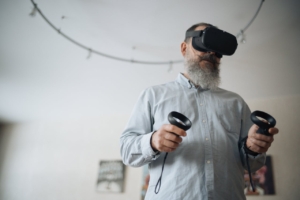America is aging. The Baby Boomers range in age from 59-77. As America ages mental health has increasingly become a concern in the overall health of the aging population. Most mental health issues are treatable, yet they go unreported and undiagnosed. Many people put the mental health issue under the umbrella of being a normal part of the aging process. Even though this is true it doesn’t mean there is not a treatment for any of the issues.
The most common mental health concern is dementia. This is also one of the costliest concerns for the aging in America. Although dementia affects the aging population it is not considered a typical part of aging. The second most common mental health concern in aging in America is depression. It is the most underdiagnosed issue, overlooked because it lies below the surface of the aging population’s problems.
There are ways we can help the aging in America receive the mental health care they need to live a better quality of life. God wants us to care for one another. Redding Christian Counseling can play a significant role in ensuring that the elderly receive the guidance, compassion, and mental health care they deserve.
Ways to improve mental health in the aging in America.
 Several strategies can be implemented to improve the mental health of the aging in America. Most of these are simple and can be done daily.
Several strategies can be implemented to improve the mental health of the aging in America. Most of these are simple and can be done daily.
Keep physical health at the top of the list.
As you strive to increase your mental health it is important to maintain physical health as well. This can be done by doing the following on a routine basis.
Maintain connection with friends and family.
Maintaining relationships with friends and family is a great way to boost mental health. This may include continuing to have relationships with the people you worked with before retirement. Meeting new people and finding new interests is also a great boost. It is important to keep connections strong rather than sink into a life of isolation.
Learn new things to improve cognitive function.
As a person retires from a profession they have held for twenty-plus years, they may find themselves feeling like they have lost knowledge. But when they decided to learn how to do something new, they began to feel as though the engagement increased their thought functions. Learning a new craft or skill is key to creating healthy cognitive function in the aging in America.
Don’t let stress get the best of you.
Stress is something that we all face. Even after retirement, most people have just as much stress as if they were working nine-to-five every day. It is vital for the aging in America to learn how to manage stress and its triggers.
It is never too late to set up healthy boundaries and let go of things that you cannot control. Allowing stress to affect your thoughts leads to other mental and physical health issues. It is an avenue to problems such as alcohol abuse, gambling, overeating, smoking, or other compulsive habits.
Learn to just have fun.
 It is a common misconception that when you get older you cannot partake in fun things like riding bikes, dancing, or other leisure activities. Making time to enjoy physical activities can increase the positive perspective that you have on life.
It is a common misconception that when you get older you cannot partake in fun things like riding bikes, dancing, or other leisure activities. Making time to enjoy physical activities can increase the positive perspective that you have on life.
Next steps
The aging population in America is increasing. There are concerns surrounding the mental health of the Baby Boomers who make up the biggest part of the older population in America. Helping this segment of our population understand how they can continue to live a positive and high-quality life is a major part of reducing the mental health factors they face.
If you or a loved one feel as though you are not living a quality life as a member of the aging population reach out to a Christian counselor at Redding Christian Counseling. They can help identify mental health issues that hinder you. Through a faith-based plan, they will help you see the positive and begin to experience a healthier mental life.
“Working Outdoors”, Courtesy of Marcus Aurelius, Pexels.com, CC0 License; “VR”, Courtesy of Mikhail Nilov, Pexels.com, CC0 License



